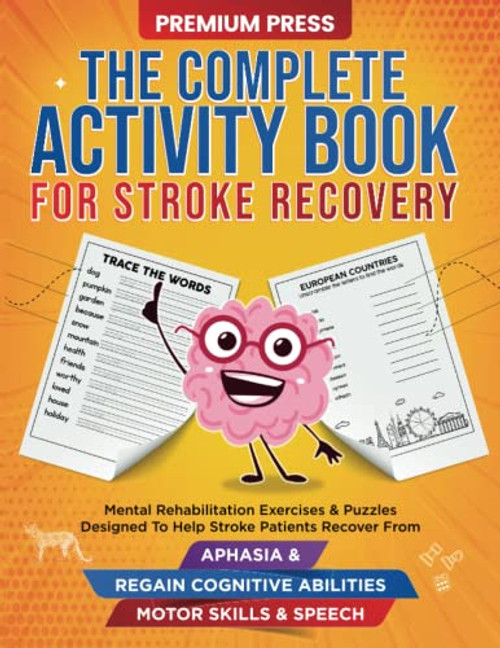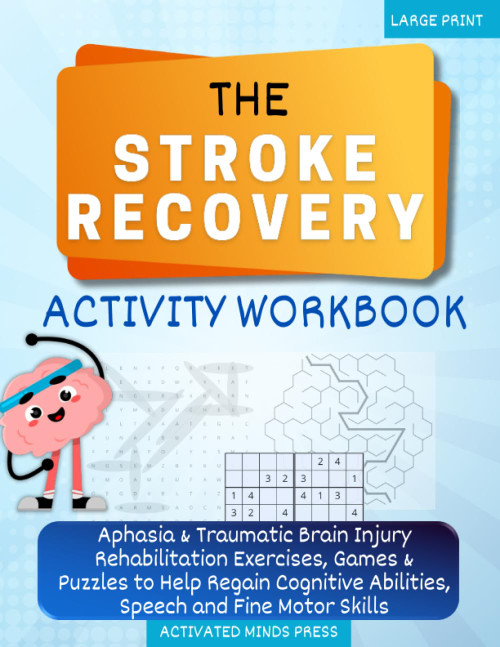#1 Best Seller puzzle book for stroke patients to recover the brain functions. Customer: Great gift for my mom!!! Word & math puzzles are recommended for patients by doctors, speech & cognitive therapists to rebuild mental abilities in language & logic. Puzzles are essential for brain rehabilitation. Neurologist: For stroke victims, I suggest word-guess puzzles because they cant really do the New York Times Sunday magazine crossword puzzle. Another word-based puzzles, word search puzzles, help to reestablish visual quickness. In addition to word puzzles, the provided shopping math & airline travel math puzzles will help to rebuild the stroke survivor's math, comprehension & logical thinking capabilities. The puzzle book also boasts a number of traffic sign coloring pages. Medical research shows: For the stroke patient, coloring is a good way for strengthening fine motor skills & to reintegrate the left and right sides of the brain. The left side is dominantly for logical processing while the right side features color graphics processing. The Diagonal Word Square Puzzles are arranged in increasing difficulty levels. The puzzle solver has to find the missing letters for short words; each row and the diagonal will spell a word. Puzzles are valuable rehab tools in the hands of people who experience the cognitive and physical deficits frequently associated with stroke. Inability to pay attention is common for stroke survivors. Other deficits may include comprehension, reading, and writing. The human brain is extremely flexible and it can be rewired for full functioning after a stroke. To learn how to pay better attention, stroke patients can solve puzzles that require focus. Others skills targeted by puzzle solving (which may improve comprehension, reading, and writing) include speech, concentration, memory, word-finding, and motor skills. When puzzles are used for stroke patients, the key is to choose a puzzle that is effective and enjoyable for the patient. The puzzles in this book are effective because they can be completed easily and in short amount of time, usually in a single sitting. Because they are not difficult, solving them imparts a sense of accomplishment. Puzzle contents stimulate emotions and memories, conversation and reminiscing. Puzzles are a great brain exercise and memory activity that captures and improves attention. Puzzles encourage the use of problem solving skills. In addition, they are fun; patients relax, smile, and laugh. The truth is, there is no real limit on the benefit we can derive from brain puzzles. They have been used throughout history for recreation, as medicine, as meditation, as a source of beauty. While this book is aimed directly at stroke survivors it is highly recommended to caregivers, loved ones and friends as well because puzzle solving is a natural team activity.
Puzzles for Stroke Patients
Kalman Toth M A M PHIL
MSRP:
Was:
Now:
$17.06 - $54.14
(You save
)
- SKU:
- UPC:
- 9781492834434
- Maximum Purchase:
- 3 units
- Binding:
- Paperback
- Publication Date:
- 2013-09-27
- Author:
- Kalman Toth
- Language:
- english
- Edition:
- Large Print

Toth M a M Phil Kalman
Brain Puzzles For Alzheimer's, Parkinson's & Stroke Patients
MSRP:
Was:
Now:
$47.64 - $63.41

Toth M a M Phil Kalman
Brain Puzzles: For Alzheimer's, Parkinson's & Stroke Patients (COGNITIVE BOOTCAMP) (Volume 5)
MSRP:
Was:
Now:
$300.00

Puzzles and Puzzles and More
UKRAINIAN Word Search Puzzles (Large Print) - Volume 1 (XTO HE CKA4E) (Ukrainian Edition)
MSRP:
Was:
Now:
$19.99 - $24.99
!







